Doug Sam had dodged the Gestapo when his plane was shot down during the war, assisted by the French Resistance and returning to active service. He would stay in the military following the war, retiring as a lieutenant-colonel in 1967. He is the most decorated Chinese-Canadian serviceman in the country's history.
Elsie MacGill, the Queen of the Hurricanes as she was known for her engineering work on the plane that did so much to win the war in the air over Europe, remained an engineer in aviation throughout her life, and a forceful voice for feminism.
One last photo from outside the exhibit space.
The walkway toward the permanent galleries is lined by photographs across Canadian military history.
The hub is the area that introduces the visitor to the story of Canadian military history. That story is organized into several galleries chronologically.
Warfare among First Nations tribes has existed for thousands of years. This first area starts to examine that.
A reproduction of an Iroquois village is placed here.
White men would start to make their presence known a thousand years ago, with the coming of the Vikings. Centuries later a more permanent presence would return, with the French and the English.
I leave off today with arrowheads and axe heads, some of the typical weapons of First Nations peoples.



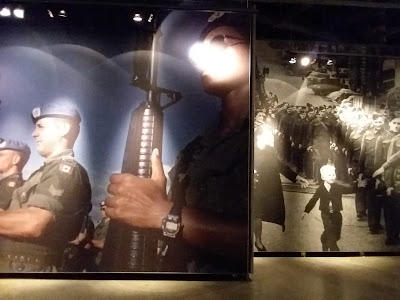

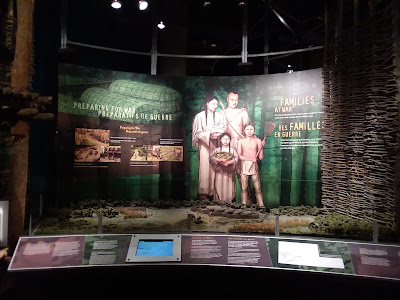
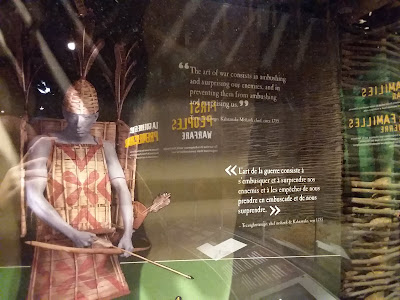
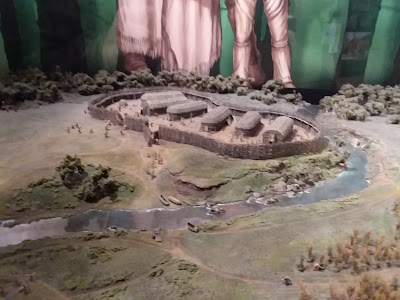
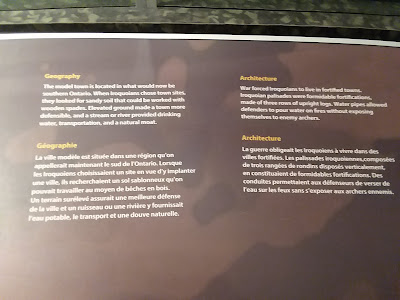




I just was in WW II as well. In my mind. Weird to read your post now.
ReplyDelete"Alien Invaders" sure sounds scary. Oh, why can´t we all "play nice"?
When I read about history I realise how lucky I've been never to have got caught up in warfare.
ReplyDelete...does conflict ever end?
ReplyDeleteElsie was ahead of her time!
ReplyDeleteI appreciate your photos giving a sense of the size and scope of this beautiful museum.
ReplyDelete@Iris: it isn't human nature.
ReplyDelete@John: I can relate to that.
@Tom: at times it seems it's only interrupted.
@Marie: yes she was.
@Jeanie: it's quite a museum.
Wonderfully documented.
ReplyDeleteA good parting and a good beginning.
ReplyDeleteI have heard how our local people suffered during the Japanese occupation here from my father-in-law. I am thankful that I wasn't born at that time.
ReplyDeletePeople are always fighting.
ReplyDeleteThumbs up to Elsie MacGill. I love hearing about the accomplishments of women.
ReplyDelete@Magiceye: thanks.
ReplyDelete@Anvilcloud: I thought so.
@Nancy: it was awful.
@RedPat: so it seems.
@Sharon: me too.
Nice exhibition. War, it seem, is always going on somewhere.
ReplyDeleteThat is an unexpectedly large jump back in time.
ReplyDeleteReminds me of how years ago I took some archery instruction and had to actually make some of the arrows I used. Took ages to make one that could shoot straight. :-)
ReplyDeleteChinese-Canadian? Will we ever get beyond these hyphenated terms and all just be known as Canadian? I hope so.
ReplyDeletePersonas así, son las que hicieron posible ganar una guerra y terminar con una penosa confrontación.
ReplyDelete@Bill: so it seems.
ReplyDelete@Jan: back into the mists of time.
@Revrunner: I've never tried archery, but find it fascinating.
@David: I can agree with that.
@Ventana: thank you.
I like the stories of individuals and what they did during the war.
ReplyDeleteIt was well presented.
DeleteMore fascinating stories of people's courage and determination:)
ReplyDeleteIndeed!
DeleteThat is quite an exhibit ~ fascinating people ~ ^_^
ReplyDeleteHappy Days to you,
A ShutterBug Explores,
aka (A Creative Harbor)
It was well thought out.
DeleteMuch to think about. Thank you William
ReplyDeleteYou're welcome.
Delete